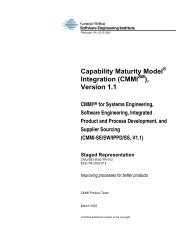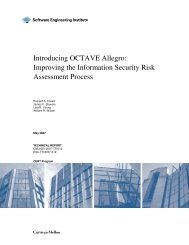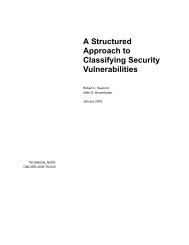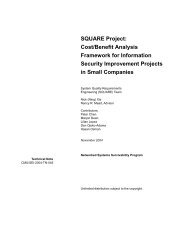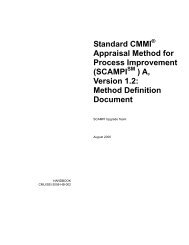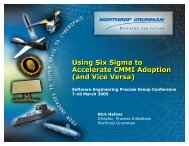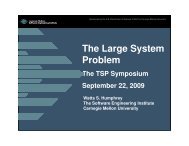State of the Practice of Computer Security Incident Response Teams ...
State of the Practice of Computer Security Incident Response Teams ...
State of the Practice of Computer Security Incident Response Teams ...
Create successful ePaper yourself
Turn your PDF publications into a flip-book with our unique Google optimized e-Paper software.
• Distributed dedicated CSIRTs: 100% perform incident handling, security policy development,<br />
and forensic evidence collection; 66% provide a hotline service and an advisory<br />
publication service, produce technical documents, provide training, track and trace intruders,<br />
and perform vulnerability assessments. None perform penetration testing and security<br />
configuration administration.<br />
• Distributed part-time CSIRTs: 100% provide incident handling, IDS monitoring, and security<br />
policy development; 75% monitor systems and networks, produce advisories, and<br />
publish technical documents.<br />
O<strong>the</strong>r general trends:<br />
• All (100%) <strong>of</strong> those who stated that <strong>the</strong>y perform penetration testing also stated that <strong>the</strong>y<br />
perform vulnerability scanning services. 71<br />
• 80% <strong>of</strong> <strong>the</strong> teams performing penetration testing identified <strong>the</strong>mselves as a centralized,<br />
dedicated, or combined team.<br />
• No military, banking and finance, or non-pr<strong>of</strong>it CSIRT participating in <strong>the</strong> survey performs<br />
penetration testing. 72<br />
• Of those teams performing legal investigations, 92% also perform forensic evidence collection<br />
and 85% also perform both tracking and tracing and artifact analysis.<br />
• All <strong>of</strong> those teams who stated that <strong>the</strong>y provide a vulnerability assessment service also<br />
perform forensic evidence collection and security policy development.<br />
• 86% <strong>of</strong> those who provide vulnerability assessments also produce advisories.<br />
• The largest number <strong>of</strong> those doing artifact analysis work are located in a centralized or<br />
combined team (32%).<br />
• 94% <strong>of</strong> <strong>the</strong> teams performing tracking and tracing also perform artifact analysis.<br />
• 90% <strong>of</strong> <strong>the</strong> teams performing security product development services also provide training,<br />
publish advisories, and perform security policy development. The majority <strong>of</strong> those<br />
who performed security product development services were centralized teams, combined<br />
teams, or centralized coordination centers. Only 25% <strong>of</strong> <strong>the</strong> ad hoc teams perform security<br />
product development services.<br />
• Of <strong>the</strong> teams performing security configurations, all were ei<strong>the</strong>r located in <strong>the</strong> IT department<br />
or <strong>the</strong> CSIRT was its own department. 86% <strong>of</strong> those performing this service were a<br />
combined or centralized team. 86% <strong>of</strong> those performing this service also monitored IDS.<br />
None <strong>of</strong> <strong>the</strong> ad hoc teams perform security configurations or IDS monitoring.<br />
71<br />
72<br />
It should be pointed out that this was <strong>the</strong> trend we saw in <strong>the</strong> responses to <strong>the</strong> CSIRT survey. In<br />
talking with o<strong>the</strong>r teams who did not complete <strong>the</strong> survey, we have seen teams who performed<br />
scanning but not penetration testing.<br />
This could mean that a different part <strong>of</strong> <strong>the</strong>ir organization performs this type <strong>of</strong> activity.<br />
70 CMU/SEI-2003-TR-001



